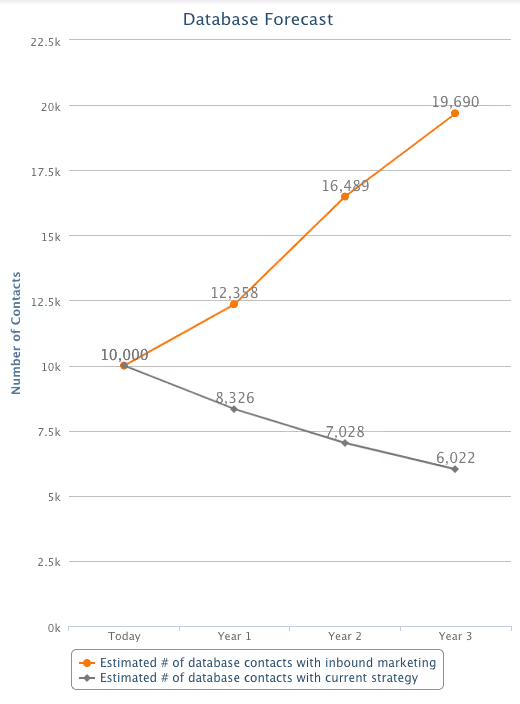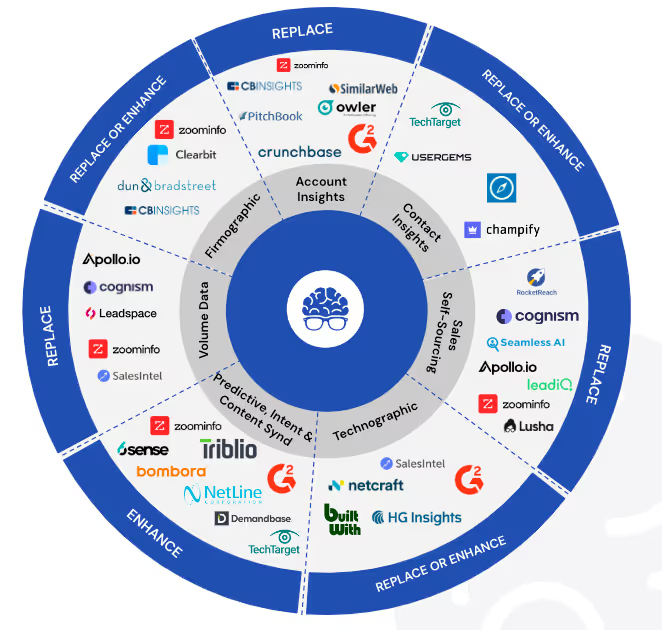In the bustling world of B2B relationships, our endeavors to forge lasting connections and craft compelling narratives often stumble upon a hidden foe, one that stealthily undermines the foundation of our outreach: data decay. This phenomenon isn't about the occasional loss of a contact detail; rather, it’s akin to finding essential ingredients missing from your kitchen when you're halfway through preparing a grand meal. Imagine discovering that your pantry, once stocked with fresh herbs and spices, now harbors jars of stale, flavorless dust. This is the predicament we face with our CRM systems, which, akin to our kitchens, lose 3-7% of their essence monthly due to the relentless tide of change.
Picture, if you will, a chicken coop where, despite your best efforts, a third of your chickens wander off each year, leaving you with fewer eggs and a diminished return on your investment. Similarly, data decay renders once promising leads inaccessible, transforming potential dialogues into dead ends and significantly denting our revenue streams and team morale. The impact is not just a matter of missed opportunities but a significant financial blow, with B2B contact data degrading at an alarming rate of approximate 30% annually, which could translate into a staggering loss in potential revenue, especially for those with extensive operations.
However, this narrative doesn’t have to end in despair. Just as a wise cook knows the importance of keeping their pantry well-stocked and their ingredients fresh, we see the beacon of hope in data enrichment services. These services don't merely patch the holes in our CRM; they replenish our reserves with vibrant, actionable insights, much like restocking our pantry with fresh produce and spices. By investing in data enrichment, we're not salvaging what’s left; we're enhancing our recipes with richer flavors, ensuring that every outreach effort is timely, relevant, and impactful.
Consider the difference between reaching out with generic messages and engaging with a lead with a tailored, insightful approach. It’s the difference between serving a bland meal and one that’s thoughtfully seasoned and prepared. By enriching your CRM with fresh, precise data post-event, you’re effectively turning a simple list of contacts into a gourmet recipe for success, ensuring that your sales team can engage with precision and maintain momentum where it matters most.
The decision to combat data decay is straightforward: it’s an investment in the health and vitality of your sales pipeline. It’s about ensuring that each lead, call, and email becomes a chance to connect, engage, and convert. In this ongoing battle against data decay, choosing to invest in the integrity and enrichment of your CRM will allow your sales strategies—and your business—to thrive.

As we navigate the complexities of nurturing our sales pipelines, let’s keep in mind our silent adversary and equip ourselves with the necessary tools and strategies to face data decay head-on, transforming potential setbacks into opportunities for growth and success. After all, in the grand narrative of our businesses, every lead is a crucial ingredient, every connection a step in the recipe, and every sale a testament not only to our strategies but to our resilience and creativity.
Tips for Combating Data Decay
Regular Data Audits
Regular data audits are akin to the essential practice of routinely checking your pantry for expired or stale goods. This process involves a thorough examination of your CRM data every quarter to ensure all information remains fresh, relevant, and usable. Just as you wouldn’t cook with outdated ingredients, you shouldn’t base your sales and marketing strategies on stale data. These audits help identify inaccuracies, duplications, and obsolete information, allowing you to maintain a clean and efficient database. By regularly pruning and refreshing your data, you ensure that your outreach efforts are always based on the most current and accurate information, maximizing the effectiveness of your campaigns and reducing the risk of missed opportunities.
Implement Data Validation Tools
Utilizing data validation tools is like having a high-tech sensor in your pantry that instantly verifies the freshness and quality of your ingredients as you stock them. In the context of CRM, these tools automatically check the validity of contact details upon entry, including email addresses, phone numbers, and physical addresses. This real-time validation helps prevent the accumulation of erroneous data, significantly reducing the risk of decay. It ensures that every piece of information in your database is accurate, up-to-date, and actionable, much like ensuring every ingredient in your kitchen is ready to contribute to a delicious meal.
Encourage a Culture of Data Ownership
Motivating your teams to treat the CRM like their own kitchen means fostering a sense of responsibility and care for the data they interact with daily. Just as a well-organized and clean kitchen is a pleasure to cook in, a well-maintained CRM system is a powerful tool for sales and marketing teams. Encouraging data ownership means each team member understands the impact of data quality on their success and is proactive about entering accurate, timely information. It’s about creating a culture where everyone takes pride in the database's integrity, recognizing that their efforts contribute to the broader success of the team and the company as a whole.
Leverage Data Enrichment Services
Data enrichment services are like the exotic spices and unique ingredients that elevate a dish from good to gourmet. By integrating these services, you can enhance your CRM with a wealth of additional insights that make your outreach efforts more personalized, timely, and effective. These might include updates on job changes, company news, industry trends, and other relevant information that keeps your data not just current but also rich and actionable. This approach ensures that your communications are always resonant and engaging, much like how the right blend of spices can turn a meal into an unforgettable experience.
Educate Your Team
Regular training on data hygiene is crucial, akin to teaching your team the best practices for managing a kitchen efficiently and safely. This involves showing them how to properly input, update, and manage CRM records to prevent data decay. Education should cover the importance of data accuracy, how to identify and rectify errors, and the role of data in shaping successful outreach strategies. Just as culinary skills are honed over time with practice and guidance, so too should your team’s ability to maintain the integrity of your CRM through ongoing learning and development.
Cleanse Only What You Can Consume
This principle is about being judicious with the data you keep in your CRM, much like being selective about what you stock in your pantry. There's no value in cluttering your database with information that isn’t directly useful or actionable. This approach encourages regular review and cleansing of your data, removing outdated or irrelevant contacts and focusing on maintaining a lean, efficient database. Just as you wouldn’t buy more groceries than you can use before they expire, you shouldn’t hoard data that doesn’t serve your business goals. This ensures that your sales and marketing efforts are always focused, efficient, and tailored to your target audience, maximizing the impact of your outreach.
Process for Dealing with Bad Records:
- Identify and Isolate Bad Records: Like segregating spoiled ingredients from your pantry.
- Cleanse and Update: Refresh or remove these items to keep your pantry pristine.
- Enrich and Validate: Add fresh details to your pantry, ensuring everything is up-to-date and useful.
- Monitor and Maintain: Regularly check your pantry for signs of decay, keeping it in top condition.
- Foster Continuous Improvement: Keep looking for ways to make your pantry more efficient and effective, adapting to new tastes and trends.
By embracing these strategies and maintaining a structured approach to data management, we can turn the tide against data decay. Remember, in the realm of B2B sales and marketing, the quality of your data is a cornerstone of your success, much like a well-stocked, meticulously maintained kitchen is to a master chef. A clean, robust CRM is not just a database; it's the heart of your business strategy, powering growth, enhancing engagement, and uplifting your team's morale and performance.




